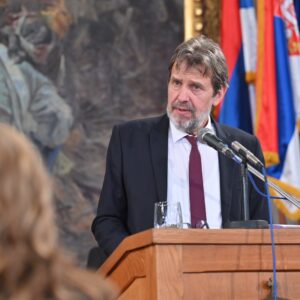The goal is to achieve equality and equal opportunities

As a result of the Serbian government drafting a strategic act, the Ministry of Human and Minority Rights and Social Dialogue has embarked on marking the most important national holiday of the members of the Roma national minority. International Romani Day was marked with a series of programmes and activities held in Sombor. The gathering in Sombor was officially opened with the Romani and Serbian anthems “Djelem, Djelem” and “Bože Pravde” respectively, performed by pianist Mina Rusché Krajnović.
Gordana Predić, the special adviser to the Serbian Deputy Prime Minister, the President of the Coordinating Body for Gender Equality and the Minister of Culture, pointed out at the opening that the Republic of Serbia has made great strides in recent years in terms of improving the position of the Roma community in our country, by establishing a Ministry responsible for human and minority rights. Ms Predić also said that, even though they are the most populous minority community in Europe, the Roma is still the most discriminated against and marginalized social group and that only together and with the help of events like the one in Sombor, we can eliminate all obstacles and prejudices, building a society of tolerance, understanding and equality.
Roma are the third most populous national community in the Republic of Serbia
In his address, the Minister for Human and Minority Rights and Social Dialogue, Tomislav Žigmanov, stated that the Roma are the third largest national community in the Republic of Serbia, but what sets them apart is that they are an extremely territorially dispersed and live across Serbia. Mr Žigmanov also said that great attention is paid to improving the position of the Roma in society and that the goal is to achieve equality and equal opportunities. He also reminded that a relevant national strategy was adopted last year along with an Action Plan for the social inclusion of Roma men and women.
Nataša Tasić Knežević, MP in the Republic of Serbia’s National Assembly, said that, according to official statistics, 147,604 Roma people live in Serbia, and their number has been increasing significantly. Ms Knežević pointed out a very worrying fact, which is that the life expectancy of a Roma person is on average 15 to 20 years shorter, and she linked this to the fact that around sixty percent of Roma live in unhygienic settlements, as well as to the fact that only a third of Roma women finish primary school and that the interrupted education or a total lack of it in the Roma women leads to early marriage and pregnancies, as well as that Roma women are often victims of human trafficking.
Ms Knežević added that the inclusion of Roma at various levels of government is precisely the way to protect the rights of Roma institutionally, but also for them to participate in decision-making.
Aleksandar Radulović, the President of the Executive Board of the National Councils of the Roma National Minority, said that in the last ten years, the Roma community has clearly progressed, especially in education, which is extremely important because education connects other areas in which the Roma national minority in Serbia is jeopardized.
Deputy Vojvodinian Secretary for Education, Regulations, Administration and National Minorities and Communities, Sladjana Bursać, noted that the position of the Roma has become one of the indicators of the degree of democratization of society and the desired equality, towards which we are consistently moving and also pointed out that the Vojvodinian government advocates the inclusion of Roma in all segments of society.
Assistant to the Sombor mayor, Branislav Svorcan, said that the town of Sombor is proud of its multinational environment, which consists of twenty-one nationalities. Mr. Svorcan also pointed out that today Roma is included in all the most important local parliamentary committees, that there is a coordinator for Roma issues in the local government, and that the Roma Inclusion Team has been formed.
Thomas Jackson, the UNDP regional project coordinator, pointed out that the main initiative is the involvement of young people from different backgrounds in the elimination of discrimination and hate speech, intending to achieve understanding and equality. In conclusion, Mr. Jackson said that the result should positively impact young people’s lives, especially when it comes to freedom of thought.
In the last ten years, the Roma community has clearly progressed, especially in education, which is extremely important because education connects other areas in which the Roma national minority in Serbia is jeopardized
After a press conference, an interactive thematic dialogue on hate speech and discrimination took place in the hall of the Sombor City Assembly. The participants were Robert Čoban, founder of Color Press Group, Nina Mitić, Assistant Minister for Human and Minority Rights and Social Dialogue, Goran Nonković, Head of the West Bačka Administrative District, Rejhan Kurtović, State Secretary at the Ministry of Human and Minority Rights and Nataša Tasić Knežević, Member of Parliament in the National Assembly of the Republic of Serbia.
Lidija Hornjak, a member of the Ruthenian national minority, Stanislava Lukić, a member of the Bunjevac national minority, and Čarna Martinović, the Sombor ombudsman, also joined the dialogue. Ljubica Gojgić was the moderator.
The program continued with the presentation of the cultural achievements of famous Roma men and women who “broke stereotypes about Roma around the world”, followed by the performance by the pianist Mina Rusché Krajnović. After the cocktail party, the guests had the pleasure of watching spectacular performances by the Roma band KAL – Rock´N´Roma, and Zejna Murkić, a well-known Serbian singer of Roma origin, followed.





